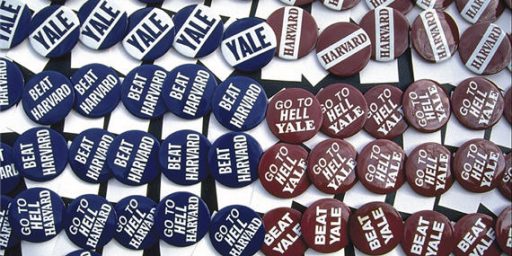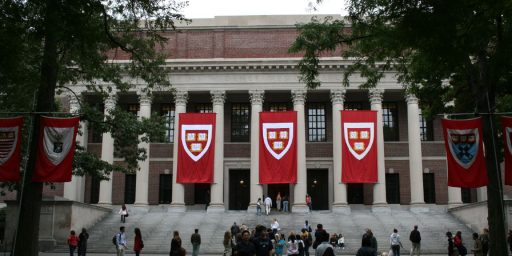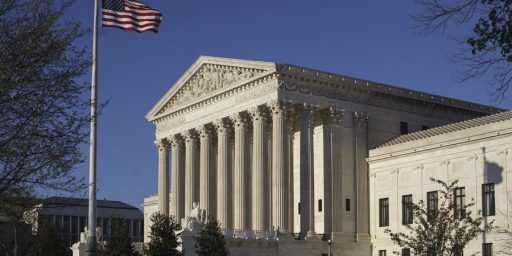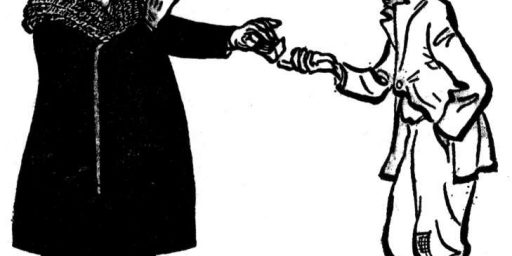Elites: Americans But Not Of America?
Charles Murray argues that the Tea Party is right to complain about out-of-touch elites.
Charles Murray argues that the Tea Party is right to complain about out-of-touch elites.
One of the easiest ways to make the point is to start with the principal gateway to membership in the New Elite, the nation’s most prestigious colleges and universities. In the idealized view of the meritocrats, those schools were once the bastion of the Northeastern Establishment, favoring bluebloods and the wealthy, but now they are peopled by youth from all backgrounds who have gained admittance through talent, pluck and hard work.
That idealized view is only half-right. Over the past several decades, elite schools have indeed sought out academically talented students from all backgrounds. But the skyrocketing test scores of the freshman classes at Harvard, Yale, Stanford and other elite schools in the 1950s and 1960s were not accompanied by socioeconomic democratization.
On the surface, it looks as if things have changed. Compared with 50 years ago, the proportion of students coming from old-money families and exclusive prep schools has dropped. The representation of African Americans, Latinos and Asian Americans has increased. Yet the student bodies of the elite colleges are still drawn overwhelmingly from the upper middle class. According to sociologist Joseph Soares’s book “The Power of Privilege: Yale and America’s Elite Colleges,” about four out of five students in the top tier of colleges have parents whose income, education and occupations put them in the top quarter of American families, according to Soares’s measure of socioeconomic status. Only about one out of 20 such students come from the bottom half of families.
[…]
Far from spending their college years in a meritocratic melting pot, the New Elite spend school with people who are mostly just like them — which might not be so bad, except that so many of them have been ensconced in affluent suburbs from birth and have never been outside the bubble of privilege. Few of them grew up in the small cities, towns or rural areas where more than a third of all Americans still live.
When they leave college, the New Elite remain in the bubble. Harvard seniors surveyed in 2007 were headed toward a small number of elite graduate schools (Harvard and Cambridge in the lead) and a small number of elite professional fields (finance and consulting were tied for top choice). Jobs in businesses that provide bread-and-butter goods and services to individual Americans, which make up the overwhelming majority of entry-level openings for aspiring managers, attracted just 1.7 percent of the Harvard students who went to work right after graduation.
[…]
The New Elite marry each other, combining their large incomes and genius genes, and then produce offspring who get the benefit of both.
Well . . . yeah. Aside from people who are true geniuses, it’s quite unusual to grow up in abject poverty — or even the lower middle class — and navigate the path to the Ivies and truly elite status. Which means that, no, the playing field isn’t completely level.
Still, aside from the most dysfunctional families and circumstances, the road from poverty to a four-year degree from a regional university and admission to the middle class is hardly full of obstacles. My wife and I are both first-generation college and we’ve managed to make it into the upper middle class. Which means our young daughter, should she have the drive and aptitude, will have a decent shot at getting into one of the great schools.
Regardless, the fact that the kids of the wealthy have a leg up is hardly new. Indeed, the path to elite status has fewer obstacles than it did a couple generations ago — much less the earliest days of our history. So, it would be odd, indeed, for this fact to suddenly be generating enough resentment to get people marching in the streets.
Murray continues:
We know, for one thing, that the New Elite clusters in a comparatively small number of cities and in selected neighborhoods in those cities. This concentration isn’t limited to the elite neighborhoods of Washington, New York, Boston, Los Angeles, Silicon Valley and San Francisco. It extends to university cities with ancillary high-tech jobs, such as Austin and the Raleigh-Durham-Chapel Hill triangle.
With geographical clustering goes cultural clustering. Get into a conversation about television with members of the New Elite, and they can probably talk about a few trendy shows — “Mad Men” now, “The Sopranos” a few years ago. But they haven’t any idea who replaced Bob Barker on “The Price Is Right.” They know who Oprah is, but they’ve never watched one of her shows from beginning to end.
Talk to them about sports, and you may get an animated discussion of yoga, pilates, skiing or mountain biking, but they are unlikely to know who Jimmie Johnson is (the really famous Jimmie Johnson, not the former Dallas Cowboys coach), and the acronym MMA means nothing to them.
The first part of this is right; the second part is nonsense. Yes, the elites are geographically clustered. Not only are those likely to go to the Ivies and achieve high social and economic status more apt to have grown up in these places but those who didn’t are likely to migrate there. For the same reasons: That’s where the elite jobs are! These are the centers of banking, law, government, medicine, technology, and academia.
And, yes, there’s clustering in cultural pursuits. Elites are, not shockingly, more interested in watching shows that are aimed at them. I recall that, during the heyday of “Seinfeld,” the most popular show in the South and Southwest was “Walker, Texas Ranger.” The audiences of those two programs tended to be distinct. (Perhaps because I was still making the transition, I was one of a relative handful watching both shows.)
But Murray is confusing his small circle of Blue Blood elites with the larger upper middle class. Almost every male I talk to, from very well off CEO and government official types to building maintenance men, can talk about NFL football. Indeed, it’s one of the truly universal topics that crosses class divides.
Now, my circle isn’t watching MMA, which I know about mostly from occasional references on PTI and other sports programming I watch. But that’s a function mostly of age rather than social class.
And, while I know who both Jimmy Johnson and Jimmie Johnson are, it’s doubtless true that the latter — who appears to be on his way to winning a 5th straight NASCAR title — is less well known. But NASCAR has always been a niche sport, with brief spikes in popularity outside the Deep South.
But the politics of the New Elite are not the main point. When it comes to the schools where they were educated, the degrees they hold, the Zip codes where they reside and the television shows they watch, I doubt if there is much to differentiate the staff of the conservative Weekly Standard from that of the liberal New Republic, or the scholars at the American Enterprise Institute from those of the Brookings Institution, or Republican senators from Democratic ones.
True! But, then, when wasn’t that the case? They used to all be trust fund kids who could afford to take a job that amounted to a hobby. Now, they’re high achieving graduates of elite schools whose parents can subsidize the meager paychecks they earn the first decade or so of their careers. But, surely, the Tea Party isn’t upset that the jobs at elite opinion journals and think tanks are hard to come by?
No, it’s about the political class. But they, too, have tended to come from the upper crust throughout out history. Maybe it’s just that there’s a growing realization that the party elites aren’t like them? Or a growing resentment of it?
Or, maybe, there’s a newfound awareness that there’s an elite consensus among the leaders of both our major parties? If so, it’s cyclical. George Wallace made a lot of headway back in 1968 telling people that “There’s not a dime’s worth of difference” between the national Democratic and Republican Parties.
Murray’s close is troublesome:
The bubble that encases the New Elite crosses ideological lines and includes far too many of the people who have influence, great or small, on the course of the nation. They are not defective in their patriotism or lacking a generous spirit toward their fellow citizens. They are merely isolated and ignorant. The members of the New Elite may love America, but, increasingly, they are not of it.
Most of the Tea Party would be less charitable in framing that last line, I’d wager. But while I think Murray’s wrong that the Elites aren’t “of America,” he’s right that a growing number of Americans believe that. Indeed, populist candidates of both parties have been touting variations of that message for years.
Now, again, I’ve got a foot in both “Americas.” I’ve spent most of my life having to worry about what things cost and living in small towns, mostly in the South. I went to non-elite schools and served in the military. But I’ve got a PhD, work more-or-less autonomously, make a good living, and now live in the Washington, DC area.
I happen to think people in both walks of live are Real Americans. But a lot of people who’ve lived their whole lives in one or the other seem not to feel that way.







I read that article and I was not sure what point he was trying to make. The affluent clearly have many advantages. That has always been true. What does he propose to do to change that? Should we have affirmative action based upon social and economic class? This really comes across as one long ad hominen attack on a vague group that he wants to label the “elite”.
My story is similar I guess. Grew up poor in small town Midwest. Eight years military. Small local college, then Ivy League medical school, but now live in Pennsyltucky. By Murray’s standards I would be an elite, I think. However, I know who both Johnson’s are, I just dont give a shit about NASCAR. Even living close to Indianapolis I never cared about cars driving around on ovals, though the spontaneous wet T-shirt contests at time trials were nice. MMA? Nope, but then I dont know anyone who actually does pilates either. Baseball (Phillies , alas), football, basketball and hockey for me.
I think resentment is probably correct. The economy sucks and someone needs to be blamed. Rather than try to track down those actually responsible for the current crisis, it is much easier to blame the “elites”. That way you never take any responsibility for your own part. BTW, wouldn’t Murray be part of the elite class?
Steve
Murray’s mistake is in answering the Tea Party charge as if its surface meaning mattered, at all.
He quotes Christine O’Donnell saying, “I didn’t go to Yale,” and then goes on to talk about Yale! That’s not where this story is. 😉
Isn’t it really about a particular set of religious and economic values being more important than book learnin’ (or accomplishment)?
Shorter: Think about why O’Donnell succeeded within the movement.
” Few of them grew up in the small cities, towns or rural areas where more than a third of all Americans still live.”
On the other hand, that third never grew up in wherever the other two-thirds grew up, so, why couldn’t one argue that one-third are the ones who’re really out of touch?
Based on his initial metric (“…four out of five students in the top tier of colleges have parents whose income, education and occupations put them in the top quarter of American families…”), Murray apparently thinks approximately 1/4 of Americans aren’t really part of America. And I’d wager dollars to donuts (or is it “doughnuts” to the non-elite?) that Charles Murray — pundit at AEI, Harvard B.A., PhD from MIT (apparently, he couldn’t leave Cambridge) in poli-sci — is part of that non-America. This is a tired argument, and it really boils down to this: people who vote without thinking are better than people who think about politics, science, arts, or anything else; we should just accept that we’re a bunch of sheep and baaa our way behind the Weekly Standard.
To be blunt, Murray is a buffoon, and anyone paying for his opinion didn’t pay enough unless they got to kick him in the nuts for it. This is a perfect example of selectively quoting data to make a point while ignoring the significant flaws about what the data says about his assertions.
– Only 1.7% of Harvard grads are going to be managers in manufacturing! (Unsaid: Not many people go on to those professions these days, and Harvard grads typically command larger salaries and have more hiring opportunities than others; they would be stupid to flock to these posts if they could make 20% more doing something else.)
– Harvard grads tend to stay at Harvard! (Unsaid: Graduate schools tend to re-enroll their own students; the same is true at the University of Washington, but I doubt Charles Murray knows anything about that.)
– Harvard grads marry each other! (Unsaid: Marriages are often a matter of shared experience, and it’s common to marry someone met at school; apparently Harvard grads are supposed to trawl the cornfields of Iowa for a more suitable partner. Also unsaid: the reverse is true, that the uneducated tend to marry the uneducated; by Murray’s logic, then, there’s a New Idiot Class as well.)
– Higher-class New Yorkers marry high-class New Yorkers more now than they did in 1960! (Unsaid: In 1960, most women didn’t work, let alone get advanced degrees.)
Charles Murray has no idea what he’s talking about, but he really wants you to believe he does. A choice quote:
Indeed, it’s really hard to get a numerical handle on something that you can’t even describe. But Brooks’ anecdotes are great. And Richard Florida must be onto something — except maybe when he estimates that 1/3 of the workforce belongs to his so-called “creative class”. I just take this as more evidence that Murray is one of MIT’s weakest PhDs.
Incidentally, I’m not sure how Jimmie Johnson is a measure of being American more than Jimmy Johnson. Apparently, Mr Murray isn’t aware that all of 16 million people watched the Daytona 500 last year; the 1993 Super Bowl (which Johnson coached the winning team of) had over 90 million. (That number is historically pretty static among Americans, too.) Assuming no increase in viewership of the SB in the last 17 years, 4/5 people who watch the Super Bowl don’t watch the Daytona 500*. And probably aren’t American.
* This is part of the Mathematical Conspiracy, whereby numbers confound the Good Doctor Murray.
I think there may also be a misinterpretation of cause and effect. The fact that most students at elite universities are from the upper middle class could simply be because the factors that allow one to rise in income to the upper middle class are also the factors that allow one to produce children that are accepted at elite schools. Such as deferred gratification, drive/ambition/motivation, social support networks, stable families, valuing education, etc.
And if you took a look at the staff and roster of “scholars” at the AEI would they be members of this “elite” that Murray is bloaviating about. Has Murray just discovered the US has a class system and traditionally (although less now than used to be the case) Republicans make up the majority of the upper middle class.
Some of these numbers Murray uses are pretty decieving. For example, he notes that there are 65 million Left Behind books sold, implying that a fifth of the population has read them. But there are 16 Left Behind books — or about 4 million sales per book. Still impressive, as book sales go, but to a much smaller percentage of the population. (Full disclosure: I read the first two Left Behind books, but gave up on them because they’re just badly written. Nothing any of the characters do makes any sense in light of the premise.)
I’d also really like to see the source of “29 million readers of Harlequin Romances.” More likely these are sales figure, and given the sheer volume that Harlequin puts out per year, and given that they’re marketing to a niche fan base, I’m willing to wager that that number is smaller by at least a factor of ten.
And MMA is an elite pursuit, not a “common man” one. At least around these parts. All the MMA fans (including myself) that I know are on the multiple degrees side of the spectrum. Most of my friends who are Nascar lovers don’t like MMA that much at all.
And “haven’t attended a Kiwanis or Rotary club meeting”? Seriously. That’s a function of age. Do you know any Rotarians under the age of 50? I don’t.
And I’m still trying to figure out how “mainstream America” is one-third of the population.
Also, I notice a distinct LACK of trends in Murray’s treatment. For example, he doesn’t seem to be aware that hip-hop is the dominant musical form on the charts. He doesn’t seem to have caught on to the fact that one of the biggest TV shows on right now “Glee” appeals to a large swath of the population (a bigger population, I might add, than Nascar fans), but definitely skewed towards the upper-end of the spectrum. I notice he doesn’t mention the popularity of “geek culture”, culminating the in the rise of video games as a pursuit of a major segment of the population and the #1 movie in America in 2008 being about Batman.
I read this article and pretty much figured that it was Murray who was out of touch.
I wonder if Murray realizes he’s shooting himself in the foot when it comes to the traditional AEI narrative of America land of opportunity for all in the free market system. The reality of course is that class mobility has been declining for years in the US. This is not unconnected with the fact real incomes for 90% of Americans have been declining for thirty years.
What struck me was the implicit assumption that it was the elites that were out of touch and not vice-versa!
My complaint wouldn’t be that the elites are out of touch but that the elites aren’t particularly elite.
@NoZe: “What struck me was the implicit assumption that it was the elites that were out of touch and not vice-versa!”
Well, there is that. The elites may be out of touch with the day-to-day experiences of the working class but the reverse is just as true if not moreso. And the elites are, almost by definition, more in touch with the news and public policy debate.
@Dave Schuler: “My complaint wouldn’t be that the elites are out of touch but that the elites aren’t particularly elite.”
Well, any definition of “elite” that encompasses the top 20 percent, or even the top 5 percent, of society is going to suffer from that problem. I’m in no sense a true elite in terms of intelligence, income, or achievement. I’d reserve that for geniuses, multi-millionaires, Nobel- or Pulitzer Prize winners, and the like. But I’m an elite by Murray’s definition and from the standpoint of those at the 50th percentile in intelligence, income, or achievement.
BTW, call it town-gown whatever you want, but this kind of stuff is as old as democracy itself, in fact, it might be endemic to democracy. It’s the basis of Aristophanes’s entire sthick. Read his plays. For the most part, they involve some poor schnook, The Real Athenian, being done to by city-slickers (read “elite”). He even drafts Socrates into the elite in Clouds, though the old man’s father was a stone mason and he himself was a builder of walls (badly if the stories are true). Socrates’s real crime seems to have been his ability to ask embarrassing questions. When the answers showed the ignorance of the person being questioned, one can’t help but think that the feeling was he was looking down his nose…. Plus ça change …
What troubles me about this Republican attack on the “elites” is that they seem to be operating from a definition of “elite” that includes being intellectual, well-read, and informed about the world.
Sarah Palin, for example, seems to revel in her detachment from that kind of world.
The funny thing is that I though being smart was supposed to be a good thing.
That’s because you’re a Communist.
Indeed.
And, I’m sorry but being a two-time SB winning coach for the Dallas Cowboys and then the co-host of the most popular NFL pre-game show for a decade plus (I think?) (not to mention a stint on Survivor) makes you the more famous of the JJs. The notion that NASCAR is more the sport of the masses than is the NFL is absurd. Is Murray innumerate? (Answer: no, but he is trying to make Southern males (aka the GOP base, aka key constituents of the Tea Party) the definition of mainstream, hence the ignoring of rap and Glee. Of course even then, college and pro football are going to outclass NASCAR as the sports of choice).
Further: part of what he is talking about in terms of TV shows pop culture knowledge is about the proliferation of shows and channels. When I was a kid if you wanted to watch TV midmorning in the summer, you watched game shows like The Price is Right because that was all that was on (or re-runs of Andy Griffth or the Love Boat). That built more cultural cohesion than now. Not only can most kids tune in the Cartoon Network instead, a lot of them have DVRs and watch only what they like.
Steve,
While I am well aware of Jimmy Johnson, I had to look up Jimmie Johnson after reading James’s post.
I guess that makes me an elitist or, you know, part of that vast majority of Americans who don’t watch NASCAR.
While I’m more interested in NASCAR than I am in, say, hockey, my interest is peripheral these days. I know Johnson only because I read SI and ESPN the Magazine and care enough to at least peruse those stories.
Obviously it’s a function of where I grew up. NASCAR wasn’t exactly a big deal in Central Jersey in the 70s/80s, after all
Apparently, Bubba Murray has more time to watch daytime television than most people.
Wouldn’t, say, American Idol be a better marker than The Price is Right or Oprah?
Indeed. I’m aware that Drew Carey replaced Bob Barker on the former but haven’t intentionally watched an episode in 30 years or so. And, while I’ve seen entire episodes of Oprah, I’m not exactly the target audience.
Wait a minute. Bob Barker was the host of The Price Is Right? I thought it was still Bill Cullen.
Dave,
Boy, did you just date yourself 🙂
Well I’m confused. I’m a high school drop-out who has never given a damn about any sport. Not even football. I make a good income, all of it from writing but I watch a lot of TV and I not only know that Drew Carey replaced Bob Barker but know a bit about Drew Carey’s career. Given my druthers I’d be dining at molecular gastronomy restaurants every night but I also have very well-informed opinions on the comparative advantages of Burger King, Wendy’s and In-N-Out. I’ve lived in 12 states, 5 of which were part of the Confederacy. I’m a Jew who grew up Lutheran and is now an atheist. I am currently on book tour in Sydney waiting for room service to bring me coffee. But I am here with my home-schooled son.
So I am having a hard time deciding whether I am “of America” or not.
A couple of thoughts: I find it funny and almost sad that every jerk-off who gets through Harvard imagines himself to be part of an elite. Line up the entire graduating class from Harvard on the right, and Steve Jobs and Bill Gates (both college drop-outs) on the left. Guess which team can buy the other with the spare change in their pockets. Guess which team will do more to shape the future.
The idea that going into finance makes you elite is almost tragic nowadays. It makes you elite in the same way that making your bones in the Mafia makes you elite. I consider them a criminal class only slightly higher on the social scale than people who make bathtub meth.
The truth is no one should waste too much time on Murray. He’s positioning himself for a job. He wants the gig of ‘non-elitist intellectual’ in the next GOP administration. So he’ll write whatever superficial drivel he has to to secure a future in the elite.
Hmm. And now I cannot figure out how to scroll back up in the comment window on myiPad so forgive me my typos..
I think there is a point to be made. The fact that everyone is willfully ignoring it because Murray made a bad argument, does not negate the fact it is there.
It matters if there is a wholly insular culture among the “elite” if they exercise an inordinate amount of control over leadership positions in business and the government. It matters if they live in a bubble, if you accept the notion that, at most levels, gaining a position is more a case of access and “who” you know than it is actual intelligence. Most people who have gotten a job, particularly a coveted one, will tell you it is more about connections than it is ability.
The odds that someone without the proper connections then will get into a leadership position are markedly lower. That is not to say it is impossible, it’s just to say there is an increased chance those who qualify as quote-unquote elites are more likely to rise to these positions. If they then live in an insular bubble, in which they are only interacting with, marrying and hanging out with other elites, then the so-called non-elites have a legitimate gripe that this effects them since the “elites” have an increased chance to get into a leadership position and set the agenda.
In other words: Non-elites are not objecting to the fact that someone from Yale or Harvard is more likely to either get chosen for, elected to or appointed to a leadership position. They are objecting to the fact that those people NOW interact with others on lower rungs of socio-economic and class scale than they ever had in the past, hence these elites have less of an actual understanding, based on experience and interaction, of the challenges that non-elites face. That is a legitimate complaint. And, as one who like most of you seems to fit on the lower end of this so-called “elite” scale, I actually tend to think it is a valid one.
Once upon a time having your own newspaper column at the Washington Post would have made this guy an elite too. I guess not anymore.
It is LESS a manner or matter of “where your roots are/were” than generational and political affiliations. Look at the sources for our information. Many of those that are involved in the “Media” are not “Baby Boomers” although there are many “Baby Boomers in the various versions of “TEA parties.”
Those in the TEA parties, were often either silenced or ignored by other “Boomers” in the Media. Now they have stopped waiting and started shouting. Mostly they are educated, many attended college, some have degrees, but nearly all “did as they were told to do… Get a job, work your way up, start your own businesses, own your house, invest and save.”
The Media is for the most part now a mix of “Gen-X” and “Millennials,” there are still aging “Boomers” around for on-air talent, but they are fading and dying off. Their script while growing up was different, “Do what you want, money will follow, and other sound bites from the “Me” generation.
Looking at “Whom” are considered the “NEW ELITES” the majority are in fact registered Democrats or have very “Leftist” views and espouse “Leftist” solutions. There is with many an actual “air of superiority” that “they KNOW better,” than people like me, and they want to “take care of” others. Other people are not “pets” nor are they “experiments” or merely dots of data for statistical analysis.
This is the divide. And unfortunately many Republicans, and many Conservatives JOIN IN this at the upper ends of “elites.” Yes, I think Sean Hannity himself, may not feel it personally all the time, but I bet that his kids do. His social circle is way different than it once was
It has always been that way. In the 1600’s there was less of a difference between the Tsar of the Russians and the Kings of England, France and Sweden. The same is true today. What is scary is when a neophyte is”vested” too soon with power and confuses he or her “own place” from habit, with their new place of power.
A poor or middle class boy from Indonesia might very well “bow” to the King of Saudi Arabia, especially if that boy was raised as a Muslim. An American teen might well think that a gift to a “state” visitor is a PERSONAL gift from him, and would choose carefully, a “personal” not “State” gift.
“Regardless, the fact that the kids of the wealthy have a leg up is hardly new. Indeed, the path to elite status has fewer obstacles than it did a couple generations ago — much less the earliest days of our history. So, it would be odd, indeed, for this fact to suddenly be generating enough resentment to get people marching in the streets.”
As is true of – well, everything that the Teabaggers now protest – they weren’t in the streets when George W. Yale/Harvard/Son of the President Bush was becoming a second-generation president.
When it comes to bailouts, I’ve seen several times the b*tching directed at autoworkers (the ones who had to take salary and pension cuts) than at Wall St.
When it comes to reining in a clearly out of control and dangerous financial system, the Teabaggers are against that.
I feel like I am reading :The Organization Man” 2010 Version. Nix Nieuws!